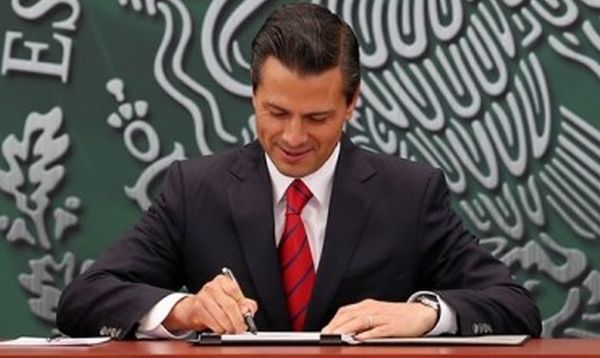Mexico City, Mexico — Mexican President Enrique Peña Nieto on Friday overhauled a decades-old election system for legislators that forbid second terms, a ban critics said resulted in elected lawmakers having little incentive to do their jobs.
"By not having re-election in Mexico, citizens have consistently voted for promises, instead of politicians' job performance," says Fernando Dworak, independent political analyst in Mexico City.
"Re-election doesn't resolve anything on its own, but it gives incentives so that better decisions can be made," he says, adding that Costa Rica is the only other democracy in the hemisphere with prohibitions on re-election.
At the legislative level, an old axiom in Mexico says lawmakers spend the first year learning the ropes, the second year doing their jobs and third year seeking another position — with many taking leave to do so.
Dworak and others say voters have been unable to punish or reward politicians for their performance in office because of a ban on re-election that goes back to the 1920s. That has resulted in an emphasis on short-term planning by public officials who rarely proposed projects that would not be completed during their three-year term.
In Congress, Dworak says, few lawmakers spend enough time in office to become expert in any areas such as finance, security, or foreign policy — unlike their US counterparts.
The new rules, signed into law by Peña Nieto, allows legislators in the lower house of Congress to serve up to four consecutive terms, with elections being held every 3 years.
 |
| Thousands of people belonging to trade unions participate in a rally in Mexico City on Friday to demand the government call for a referendum on the energy reform enacted in December. The reform was part of a deal to end a ban on re-election, which was signed into law Friday. (Photo: Alex Cruz) |
Senators will now be allowed to serve a pair of six-year terms. The president, state governors, and mayor of Mexico City are still limited to a single term of six years.
State legislatures are able to approve re-election for mayors, but it's uncertain how many will do so.
It is in cities where the ban on re-election proved especially costly, say critics. Mayors often focus on highly visible projects like parks and overpasses — which can be completed within a single, three-year term — while neglecting infrastructure like sewer systems and the waterworks.
The lack of re-election has also permitted political party bosses to control politicians' careers, Dworak says, as lawmakers followed instructions from their unelected superiors, instead of constituents, and could be kept off of the ballot in future races as punishment for falling out of line.
"Without immediate re-election, lawmakers respond to those who are going to give them their next job," Dworak says.
The Institutional Revolutionary Party (PRI,) ruled for 71 straight years until being unseated in 2000 and based some of its legitimacy on opposing re-election, even though its bosses decided who could run and who could not.
The new rules still allow party bosses to control ballot access: Politicians can seek re-election only with the political party they ran for in their first campaign and cannot switch sides or run as an independent.
The PRI also had practical reasons for opposing re-election. The party previously had literally armies of foot soldiers in Mexico's provinces who could fill seats being vacated, says Federico Estévez, political science professor at the Autonomous Technological Institute of Mexico.
Those armies "thinned out" over the past decade, however, making re-election more palatable for the PRI, Estévez says.
The introduction of re-election comes as part of a broader political and electoral reform, demanded by the opposition National Action Party (PAN) in exchange for supporting an opening the country's previously closed energy industry.
The energy reform was approved in December despite being a touchy topic in Mexico, where public ownership of oil has represented sovereignty and self-respect for many Mexicans and the 1938 expropriation of the industry was seen as a seminal moment.
The political-electoral reform also allows for the formation of coalition governments, obligates parties to nominate women for 50% of the candidacies in legislative races and requires political parties to receive 3% of the vote each election to remain registered.
Original Story



